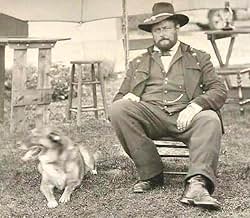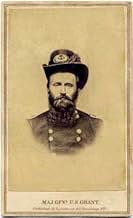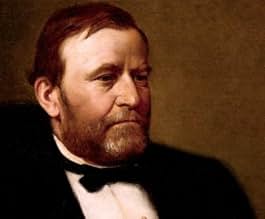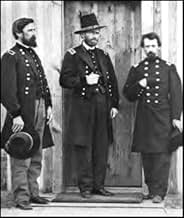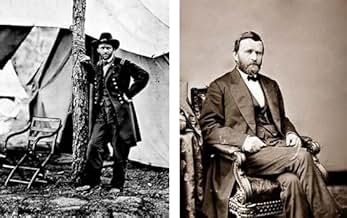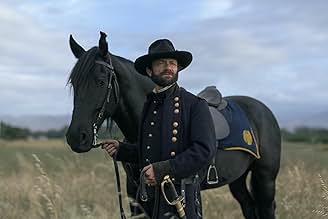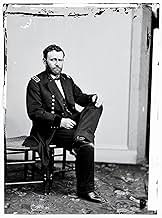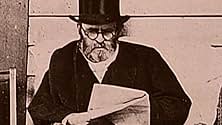VALUTAZIONE IMDb
8,4/10
2510
LA TUA VALUTAZIONE
L'esame della storia della vita di Ulysses S. Grant utilizza la sua prospettiva e le sue esperienze per esplorare un periodo turbolento della storia: la guerra civile e la ricostruzione.L'esame della storia della vita di Ulysses S. Grant utilizza la sua prospettiva e le sue esperienze per esplorare un periodo turbolento della storia: la guerra civile e la ricostruzione.L'esame della storia della vita di Ulysses S. Grant utilizza la sua prospettiva e le sue esperienze per esplorare un periodo turbolento della storia: la guerra civile e la ricostruzione.
Sfoglia gli episodi
Recensioni in evidenza
The six hour miniseries is best taped, so one can zip past all of the commercials, and learn about Ulysses S. Grant and his role in American history and how he won the Civil War and presided over Reconstruction, an experiment in democracy that went badly wrong. It is not hard to imagine that had Lincoln not been assassinated, history might have turned out much differently with Grant playing a more winning hand than he was dealt. The series pulls no punches in dramatizing just what a horror the Civil War was and the tremendous losses on both sides. When Grant successfully participates in the Mexican American War of 1848, alongside other officers who would soon work for him and against hime, his career seems on an upward trajectory, but he get sidelined into an obscure post in Fort Humboldt California with nothing to do, and he becomes melancholy, and turns to drinking, which forces his commanding officer to force Grant to resign. He returns to civilian life and does poorly, until the Civil War breaks out and he is given a commission once again to lead a regiment as a brigadier general. From there it is mostly one successful battle at a time, until he is promoted to major general and given command of all of the western army. From there he successfully launched a successful attack in the heart of the south at Vicksburg, with some of the most brilliant strategic maneuvers in the history of armed warfare. For that he gets promoted to three star general and put in command of the entire Union Army. Aside from a couple of notable failures, one a major defeat at Cold Water Virginia, Grant eventually corner's Lee's Army of Northern Virginia while General Sherman takes Atlanta, thus forcing a surrender at Appomatic. A major triumph is followed one week later by the assassination of Lincoln and history makes a major course correction. Andrew Johnson is a southern sympathizer and thwarts every attempt by Grant to take control over southern whites who are slaughtering freed slaves. Not until Grant becomes president, can he put a stop to this and put down the KKK. Grant as president though, because of his lack of guile, is undermined by subordinates who are corrupt, and America is by now tired of the reconstruction efforts in the south. When Grant leaves office, the KKK is on the rise again and reconstruction is basically a failure which has lasting repercussions to this day. Grant's image is later tarnished by southern historians who attempt to rewrite the history of the Civil War by painting it as a states rights issue and not about slavery. Grant comes accross as a villain. This miniseries tries to put this story right and to a large extent it succeeds. Grant is one of those great leaders who is about as straightforward as they come. His only apparent weakness is in sticking with subordinates who didn't deserve his trust, and he made some political moves as president that were regretful like not stamping down the KKK once and for all. The comments from historians throughout the series were very helpful and insightful. The acting was accomplished and the war scenes were realistic. This was a very worthwhile effort to try and put the record straight about Grant.
This documentary was always going to stand or fall on the portrayal of Grant and credit must be given to the Casting Directors Suzanne Smith & Bonnie Rodini for casting the criminally underused JUSTIN SALINGER. While Salinger might not be the perfect lookalike, it was clearly far more important to cast an actor capable of playing the many subtle nuances and complexities of the man and Salinger does a superb job here with his performance of Grant and I felt he was closer to the man than anyone to have portrayed him previously. While praising the actors, I am also going to single out the young man who played the Union private in the first episodes excellent opening sequence, ARTHUR FALKO - Again, extremely good casting, it was as if this one individual was wearing the entire history of the war on his face in those opening moments. Anticipation, fear, dread and later bravery and valour. I expect to be seeing a great deal more of him on our screens in future.
The series format jumps from documentary commentary and anecdotes from various historians and it was nice to see dialogue offered from both a male and female black historian on the man and the conflict in which he fought. This was a war over which the issue of slavery was key, so it felt quite right too and made this aspect of the series, far more interesting to watch than just having the usual older generation historian faces chipping in their valulable, but rather well worn comments.
The most engrossing segments of the show however are the dramatic segments and it was these and Salingers performance that kept me engaged in the show.
While I would have perferred to see a straight up drama mini series about the man without any of the historical commentary, this never the less is an extremely well made piece covering the life and motivations of one of the most equally loved and hated Commanders of the Civil War. I found it both educational and enligtening. Despite the more restrictive budget for a peroid piece the drama scenes are extremely well handled and critism by armchair historians about drill and uniforms are poorly founded. The uniforms are authentic, the drill of the early Union army appropriately poor in the early episodes, as was the army's state at this time. People need to remember, just because you read something in a book, doesn't make it a verbatim mode of action for every individual. War is complex, conscripted soldiers are not veterans, nor at first a professional army. It would be some time before the Union became one.
It would be great to see more in the series in a similar fashion. This was very enjoyable and I hope will engage a younger audience in the subject. That is the most important thing of all. The youth are, after all, the best hope for keeping history alive in the future.
The series format jumps from documentary commentary and anecdotes from various historians and it was nice to see dialogue offered from both a male and female black historian on the man and the conflict in which he fought. This was a war over which the issue of slavery was key, so it felt quite right too and made this aspect of the series, far more interesting to watch than just having the usual older generation historian faces chipping in their valulable, but rather well worn comments.
The most engrossing segments of the show however are the dramatic segments and it was these and Salingers performance that kept me engaged in the show.
While I would have perferred to see a straight up drama mini series about the man without any of the historical commentary, this never the less is an extremely well made piece covering the life and motivations of one of the most equally loved and hated Commanders of the Civil War. I found it both educational and enligtening. Despite the more restrictive budget for a peroid piece the drama scenes are extremely well handled and critism by armchair historians about drill and uniforms are poorly founded. The uniforms are authentic, the drill of the early Union army appropriately poor in the early episodes, as was the army's state at this time. People need to remember, just because you read something in a book, doesn't make it a verbatim mode of action for every individual. War is complex, conscripted soldiers are not veterans, nor at first a professional army. It would be some time before the Union became one.
It would be great to see more in the series in a similar fashion. This was very enjoyable and I hope will engage a younger audience in the subject. That is the most important thing of all. The youth are, after all, the best hope for keeping history alive in the future.
The input from historians and facts made this a new introduction to Grant as a person. Much of which I didn't know. Really enjoyed it.
10trudjoh
I am an amateur student of history but have always found any discussion of Grant and the western campaigns to be lacking. This has filled in so many gaps for me. I do agree with too many commercials but I record and fast forward so I can rewatch and learn. As for the rest of the reviews. I find most viewers to suffer from a terrible lack of imagination. I don't care to have exact likenesses if they are close enough to invoke the period. The visuals if the battles were excellent. The comments on uniforms were interesting since by this time most soldiers were battleworn. The point to this was to educate on US Grant and it did that. Bravo!! Grant's views on slavery and the value of men were refreshing. I think I would have liked him except for the smell of cigars!!
Well done with great commentary with excellent experts.
Lo sapevi?
I più visti
Accedi per valutare e creare un elenco di titoli salvati per ottenere consigli personalizzati
- How many seasons does Grant have?Powered by Alexa
Dettagli
Contribuisci a questa pagina
Suggerisci una modifica o aggiungi i contenuti mancanti



